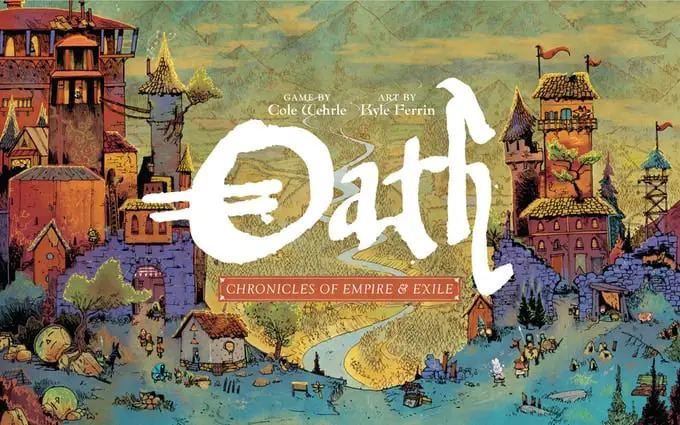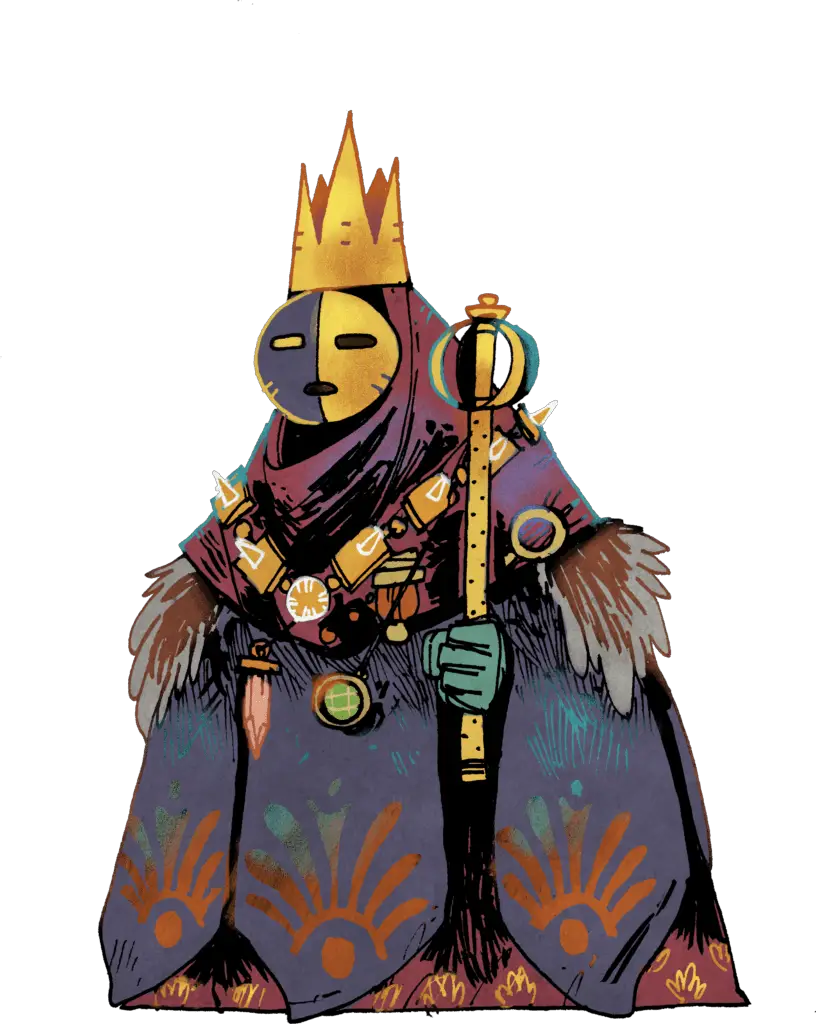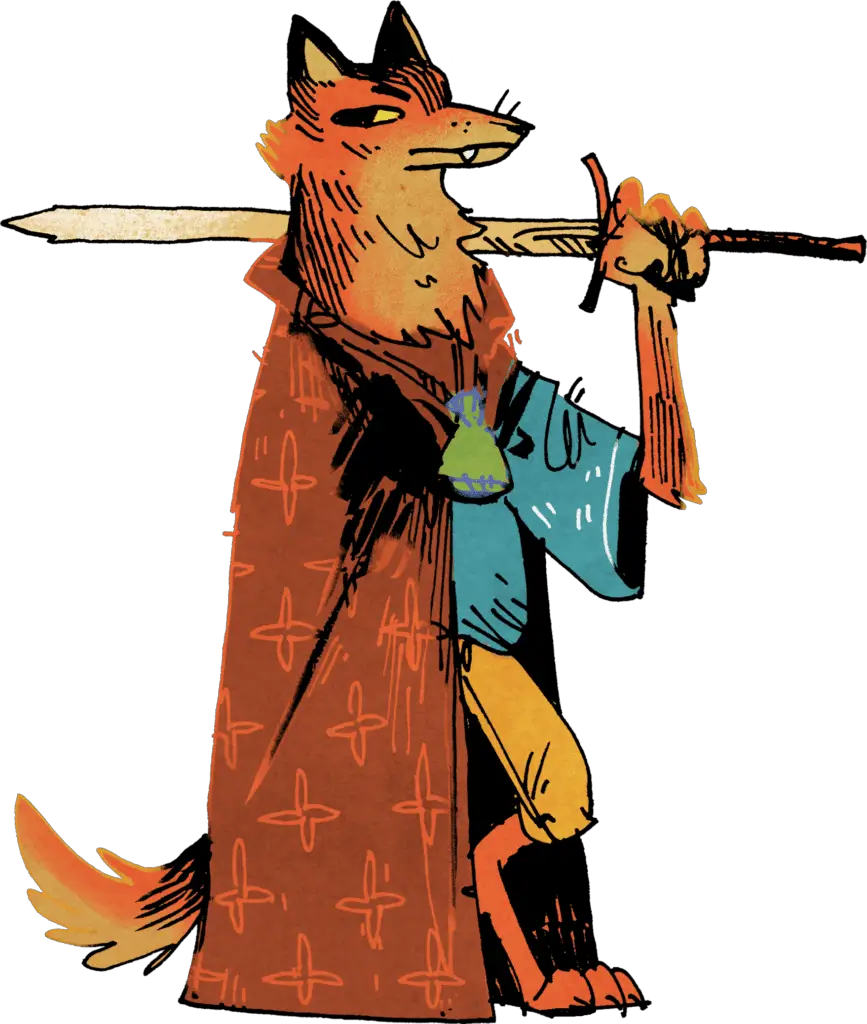If you hadn’t heard, January 14th was a massive day for board games on Kickstarter. Over $2 million was raised in just one day to support brand new games from publishers great and small. A sizeable chunk of that, over $500,000, went to Leder Games’s latest campaign to support Oath: Chronicles of Empire & Exile, the newest strategy game from Cole Wehrle. The success of games like Pax Pamir and Root (one of our games of the decade), and his help with other big releases from Leder like their Vast line, meant that the anticipation for his newest game was high on launch day. Now on Day Four, the campaign has raised $665,000, over 10x the project’s goal. We got a chance to catch up with Cole to learn a little bit about the new game, as well as how it fits into his greater design ouevre.

What was the genesis of Oath? How long did it take to get it from idea to table?
I’ve been working on a game like Oath for a long time. Years. It’s earliest versions were built sometime around 2007 or 2008. But the game didn’t really start to come together until 2018, while I was finishing Root. I pitched the game officially to Patrick that summer and he gave me his blessing to start devoting serious time to the design. Over that year, while working on developing Vast: the Mysterious Manor and helping with the new Root material, I kept pushing at Oath. I went through many iterations and on the tenth version the game finally took off and moved into active development where it has been for the past six months or so.
So, to answer your question directly, it took a long time.

Are there any direct sources of inspiration that you pulled on?
I pulled on mountains of sources. I approach a game design project the same way I used to approach my research. I go to the library and pull every book I can find on the subject. I spent a lot of time looking at novels, histories, and, of course, games. Campaign-style strategy games from the 1980s were a critical inspiration (Imperium, Blood Royal, etc). I also drew deeply on my experience working on Pamir and the other Pax games.
What is “a game that remembers”?
Just what it says. Oath remembers how it was played. This means the game is capable of telling really epic stories without an eight-hour play time. It’s a fast game that’s able to tell its stories slowly.

Can the group makeup of the game change each time without the “history” of the world being damaged?
Players can come and go as they see fit. Each game will inform the next game regardless of who is sitting down at the table. Whether or not those changes constitute “damage” will likely depend on our perspective. The only constant is change.
What differentiates Oath’s approach to long term gameplay from legacy gaming? Was that difference a conscious choice?
Legacy games provide prepackaged narratives. They might be branching narratives or be linear, but in either case they are manicured to produce certain dramatic experiences. Oath isn’t like that at all. The system is wide open for the players to play in. I’ve played the game probably close to a hundred times at this point and I am still surprised by the ways it can turn.
You seem to have a lot of games that draw on politics and, especially, history. Where does that interest come from?
I’ve always been a curious person. I originally studied to be a journalist because I enjoyed talking to people and learning about their lives. That curiosity extends to the music I listen to, the movies I watch, and, most importantly, the books I read. I do my best to read widely both in terms of the authors and genres. One book tends to lead to another too so at this point my interest in history comes from my earlier interest in history which comes from my earlier interest in history.
Your most recent titles with Leder, Root and now Oath, are less rooted in “real life” history than your earlier work (as much as we’d like little woodland critters to have swords), are you moving away from purely historical games or is it just how your work is right now?
I don’t see it as a shift. I’ve always been interested in these types of games, but I didn’t have access to that audience. Root gave me that access and my work at Leder Games will continue to work in more fantastic settings. Likewise, I hope to keep doing history games and publish them with my brother at Wehrlegig.

How much input did you have on the look and feel of the game, beyond mechanics? You do game art yourself, and I’m curious what it’s like working with Kyle Ferrin on the really unique look of the game.
Our process at Leder Games is deeply collaborative. Kyle and I talk a lot about the look of our projects. At the same time, I do my best to get out of his ways. I rarely give him specifics and would prefer that he is an equal partner in fleshing out what Root or Oath is and how the world feels.
If you were to rank Oath by “weight” compared to your previous games, where would it land?
In terms of strategic depth and general rules overhead, it’s pretty similar to Root or Pamir 2e. I think the game takes a bit longer to teach than Root (it’s a bit like learning two factions at once!). But the turns themselves are shorter, so the thing really speeds along once players know how to play it.

What rule was the hardest to get “right,” or was the stickiest problem to fix in playtesting?
Combat, by far. This game went through several different combat systems and it was hard to find something that worked within the game’s scale. Oath is a generational game so a system that represented a battle never felt right. I needed to go bigger. But there aren’t very many games that simulate an entire military campaign in a single action (and do it quickly). It’s always fun to scout out new design territory, but it’s scary too.
Do you prefer to be the Exiles, Citizens, or Chancellor?
I love playing the Chancellor. It’s quite difficult and a very different experience, despite the fact that you share almost all the same rules!

The campaign for Oath runs through Tuesday, February 4th, and you can learn more or make a pledge on the game’s campaign page! And don’t forget to keep an eye on The Fandomentals for all the latest news, reviews, and interviews from the world of board games.
Images via Leder Games and Cole Wehrle

